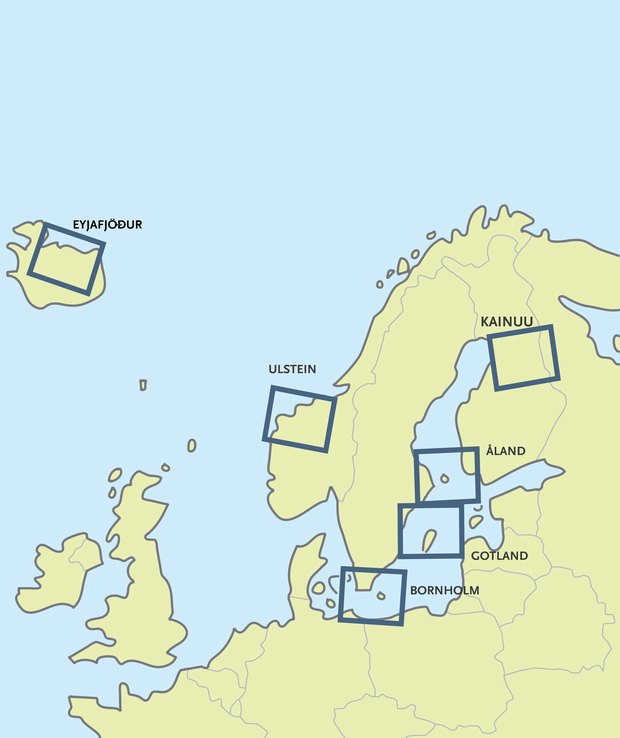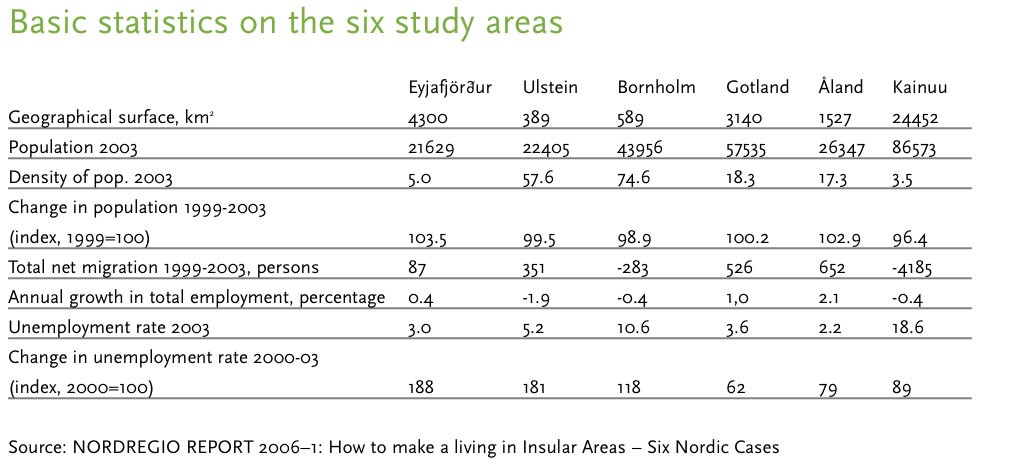
Challenges to insular income systems in the Nordic Countries is a Nordregio-project initiated by the late Lars Olof Persson. It aims to examine how people living in insular areas generate income. For this particular project, six different areas were selected: Bornholm in Denmark, The Eyajafjödur in Iceland, Gotland in Sweden, The Kainuu region in Finland, The Ulstein region in Norway and Åland.
Insularity is defined here by the length of the daily commute to and from work – in relation to geographical limitations. In other words, insularity can entail living on an island, living in a valley surrounded by high mountains with no tunnel exits, or in a sparsely populated area with long distances to nearby labour markets.
Compared to more urbanised areas the six study areas discussed here are characterised by their low population densities.
Nonetheless, despite this common feature, the six areas clearly differ in size and population. Kainuu and Eyjafjör∂ur regions are large and very sparsely populated territories, while also being characterised by significant distances to their national capitals.
Ulstein and Bornholm are the smallest and the most densely populated areas, while Åland and Gotland define a middle group of relatively sparsely populated island territories, however with direct and rather well equipped transport links to the capital regions of Helsinki and Stockholm.
A particular part of the study has been based on interviews with individuals, seven to ten in each community. The aim here has been to learn how people find solutions to securing an income in such areas.
In the table on page 8 some key facts on the regions are presented. Pages 14 to 20 provide factual information and detailed maps on the individual areas.
Pages 8 to 13 see us examinining some of the issues in more detail, in parti-cular: Labour and employment possibilities, with a particular view to self-employment and entrepreneur-ship. In addition, we also look at the role of business start-ups, the public sector, higher education, cultural inputs and transport, with the latter being seen as crucial to the positive development of such insular societies.
The following articles are all based on NORDREGIO REPORT 2006:1 How to Make a Living in Insular Areas – Six Nordic Cases. The actual report was prepared by Maragreta Dahlström, Andrea Aldea–Partanen, Katarina Fellmann, Sigrid Hedin, Nino Javakhishvili Larsen, Hjalti Jóhannesson, Jesper Manniche, Grethe Mattland Olsen, and Tage Petersen.
Important additional input was also provided by Antti Leppävuori, Gitte Hagelskjaer Falkenstrøm, Helena Karsdóttir, Lasse Karlsson, Lena Thalin, Lene Foss, Svein Rødset and Wolfgang Pichler, all of whom made presentations at the Nordregio seminar, Facilitating Employment in Insular Labour Markets, held in Stockholm 4th – 5th May 2006.
All of these texts have been edited for this magazine by Odd Iglebaek, who is responsible for their selection and overall content. Sara Östberg contributed with additional research help. The maps, all of which are copyrighted, were prepared by Stig Söderlind, at Kartor & Diagram.
